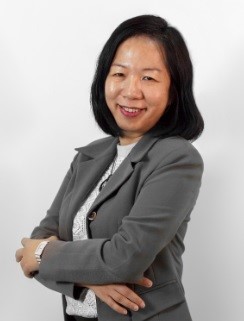Ask the Expert: Financial Planning for Small Businesses
Prior to WIEF #iEmPOWER session on 26 November 2020, financial planning expert and founder of Sohow Sdn Bhd, Hew Hui Shan, answers a few questions from small business owners on financial planning during a pandemic.
Prior to her speaking engagement for WIEF #iEmPOWER virtual session on Cash Flow Management During a Pandemic on 26 November 2020, Hew Hui Shan takes time off to respond to questions posed by a few small business owners on how to manoeuvre around a tough economic period. Besides starting a business training and coaching firm, Sohow Sdn Bhd, Hui Shan is also a financial planning expert. She has developed a structured and easy to follow Business DNA for Success program that help startups or existing businesses to be clear on, among other things, business goals and direction, profitability and cash flow, as well as how to implement their business step by step to achieve success.

Here’s Hui Shan’s practical and easy to follow response to some burning questions on financial planning from small businesses employing between five to 20 staff that offer services such as film production, PR consultation, interior design and family-owned boutique hotel. It’s also a sneak peak into what you can expect from her WIEF #iEmPOWER session on 26 November 2020.
Q1: What resources are best for small business owners to draw upon during this pandemic? And which agencies can provide them with the best support to navigate this economic turmoil?
Hui Shan says: When expenses are more than income, we are faced with a cashflow challenge. In order to overcome this challenge, we can either reduce our expenses or increase our income. If we’re consistently facing negative cashflow because we’re unable or unwilling to reduce our expenses, then any resources that we put in, can’t help us in the long term.
Say, you managed to get a loan which you’ll need to repay over a certain period. If you don’t reduce expenses, when the loan money is fully used up, you’ll not only need to borrow more to maintain your current expenses but you’ll have more debts that you’ll need to repay. Your cashflow challenge will be worse than before.
Let’s talk about increasing income. First, you must be willing to get out of your comfort zone. Next, look around your environment. See who needs help and willing to pay you to solve their ‘pain’. Finally, craft a business to help these people. In short, my advice is not to focus on borrowing more money but focus on reducing expenses and explore opportunities to earn more money. Borrowing to maintain a lifestyle is never the answer.
If you really need to explore sources for funding, you can Google on funding for startups, funding for women entrepreneurs, funding for specific groups such as single mothers, technology, ethnic communities, government initiatives for SMEs, state funding, angel investors or even crowd funding in your own community or country.
Q2: Percentage wise, how much should one set aside as buffer, as well as for development?
Hui Shan says: Generally, I’ll always recommend the following percentage of spending or savings on your income.
- 10 per cent Financial Freedom Account: this is your golden goose, never to be spent unless for investment or to start a business. Purpose of this account is to help you generate more money. In other words, to lay more golden eggs.
- 10 per cent Long Term Savings for Spending: this is savings for your children’s education, car replacement, house renovation or as contingencies. This is a planned saving, building of reserve for up-coming expenses.
- 10 per cent Education: this is for your personal education, not your children’s. If you don’t grow your mind, you can’t achieve more. Like Benjamin Franklin said, ‘If you think education is expensive, try ignorance.’
- 55 per cent Necessity: if you can’t live with 55 per cent, simplify or increase your income. Think long term, not short term.
- 5 per cent Play: this is for things that you never usually do such as a body massage or dine at a fancy restaurant. This is important for your wellbeing, so make sure that you spend this amount on a monthly or quarterly basis.
- 5 per cent Give: find happiness in the ability to give, no matter how big or small the amount is.
- 5 per cent remaining: you can top up in whichever category that matter most to you
Q3: How long, do you think it would take for the market to recover, once the pandemic is over? And what’s your three advice for small businesses to build financial resilience during the recovery period?
Hui Shan says: This isn’t the first time that a crisis has struck us. In this lifetime, there’s been the likes of Spanish flu (1918), Asian flu (1957), HIV (1981), SARS (2003) and now COVID-19 (2019). All are equally bad. But the difference is just a matter of how much the pandemic has impacted us personally. As things happen in a cycle, then the relevance of when the market will recover or when the pandemic is over is no longer relevant. The change starts now. The change starts with us, today.
My advice to small business owners:
First, start a business that you’re familiar with, not something that you think is going to be profitable. If you know nothing about the business that you plan to venture into, you need to spend time learning about the industry and the business before you start this business. This includes talking to your target market, competitors and suppliers. Do market validation before starting. Don’t just rely on ‘partners’.
Second, be prepared to work very hard. Don’t expect an ‘easy button’. Demand may be limited, even during recovery period. Moreover, there are much more to business than just buying and selling products. Every successful businesswoman needs to build relationships, understand the everchanging market, know about accounting and statutory requirements and much more.
Lastly, be a specialist. Understand your target market well. What do they really want that you can provide better than your competitors? Being able to provide a good service or a good quality product is merely expected. If you’ve no differentiation, then you’ll always be at a price war.
Q4: How to financially plan for a marketing strategy for your small business when you don’t have capital to market it?
Hui Shan says: During this internet era, there are many zero or low cost marketing strategy. If you have little budget, promote yourself as the brand ambassador. Say, you’re in the health and wellness industry, make sure that you practice what you preach and have an image of health as well as wellbeing yourself. Build a community of potential customers that are passionate about health and wellness on social media, share meaningful knowledge about health and wellness, practice storytelling, share promotions from time to time as well as testimonials. Offer referral incentives. It’s important not to sell to the room, sell through the room.
Q5: How to pay expenses such as taxes, EPF, etc, of re-opening a small hotel and still make a profit in the first few months of re-opening?
Hui Shan says: Depending on the location of your hotel, who are your regular customers? What can you do with your hotel space besides just renting rooms? Your ability to provide other services such as catering from your hotel kitchen, can make a profit after re-opening. Start thinking out of the box and start promoting now. Don’t wait for re-opening. Offer good discounts for early sign-up. Provide money back guarantee, if necessary.
Q6: How to secure bridge financing to facilitate operations and projects?
Hui Shan says: If you’re a Malaysian, Axiata and Grab are offering supply chain financing that’s collateral free, for up to 90 days. You can also Google for supply chain financing or factoring financing offered by fintech financial institutions, banks or financial institutions in your own country.
Q7: How to encourage prompt payment without impacting profit margin?
Hui Shan says: Know your target market well. Know where you can help provide added value that may be at zero or minimal cost to you. But it must be something ‘valuable’ to your target market. For example, you’re selling new computers, source a free voucher for computer diagnostic, valid for 18 months from your friend who is in the computer repair services. You offer this free voucher to your customers who’re willing to buy on cash basis. This is a win-win strategy for you and your friend.
Q8: Lastly, what can participants expect from you during your session at WIEF #iEmPOWER?
Hui Shan says: Topics that I’ll be talking about cover both personal and business finances. They include common mistakes about money, how to manage debts and save for long term financial freedom, how to manage cashflow in business, how to build a money pipeline in business, how do we ask for a loan and what do funders look for when deciding to approve your loan. So, be sure to join me at the session on 26 November 2020. I look forward to seeing you then.
Note: Register now for WIEF #iEmPOWER virtual session on Zoom, themed Cash Flow Management During a Pandemic on 26 November 2020. The session is complimentary. Check this link for the programme.
Follow us on Facebook, Instagram and Twitter for updates on WIEF initiatives and articles.
Main photo by Blake Wisz on Unsplash.


